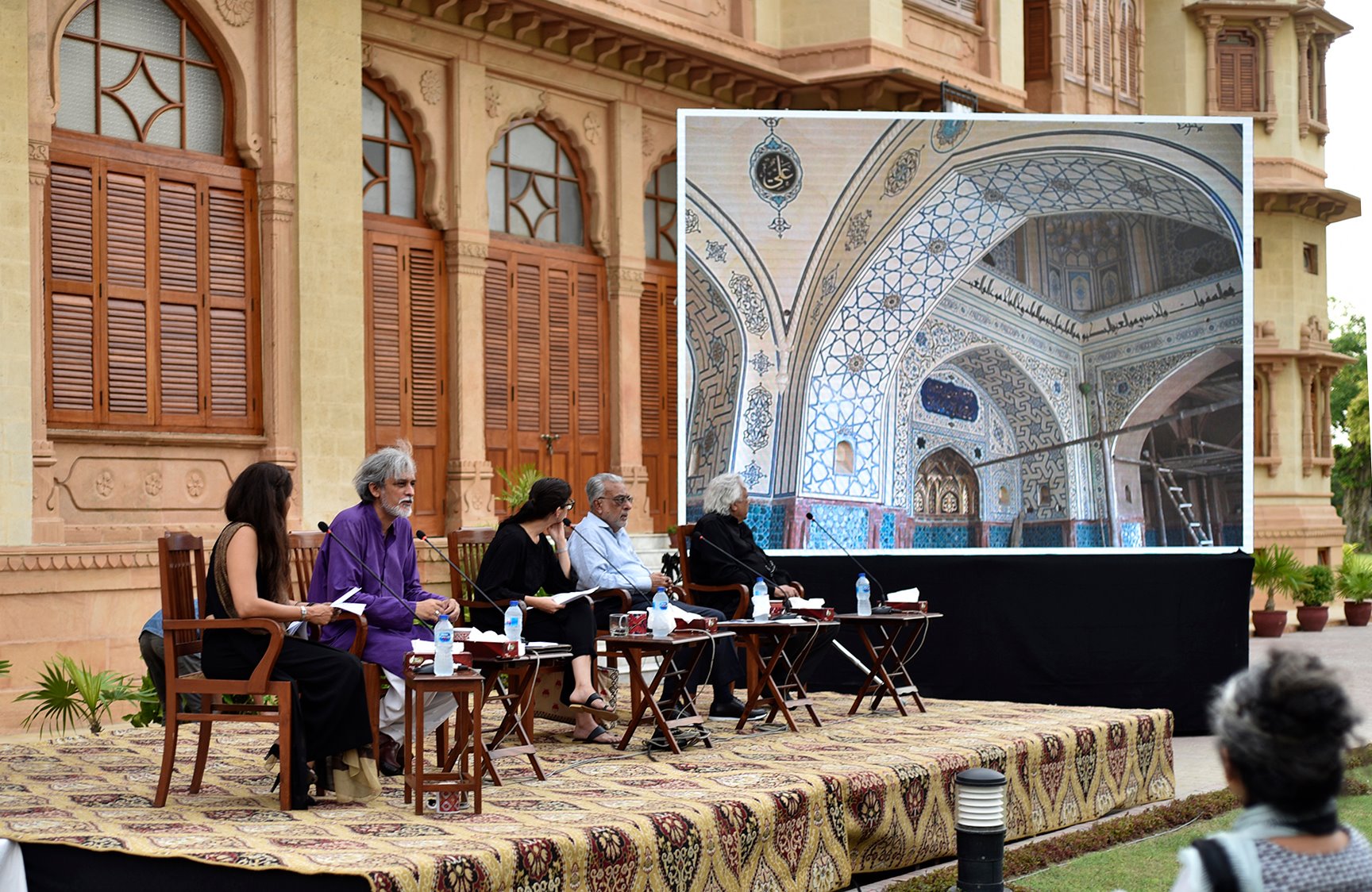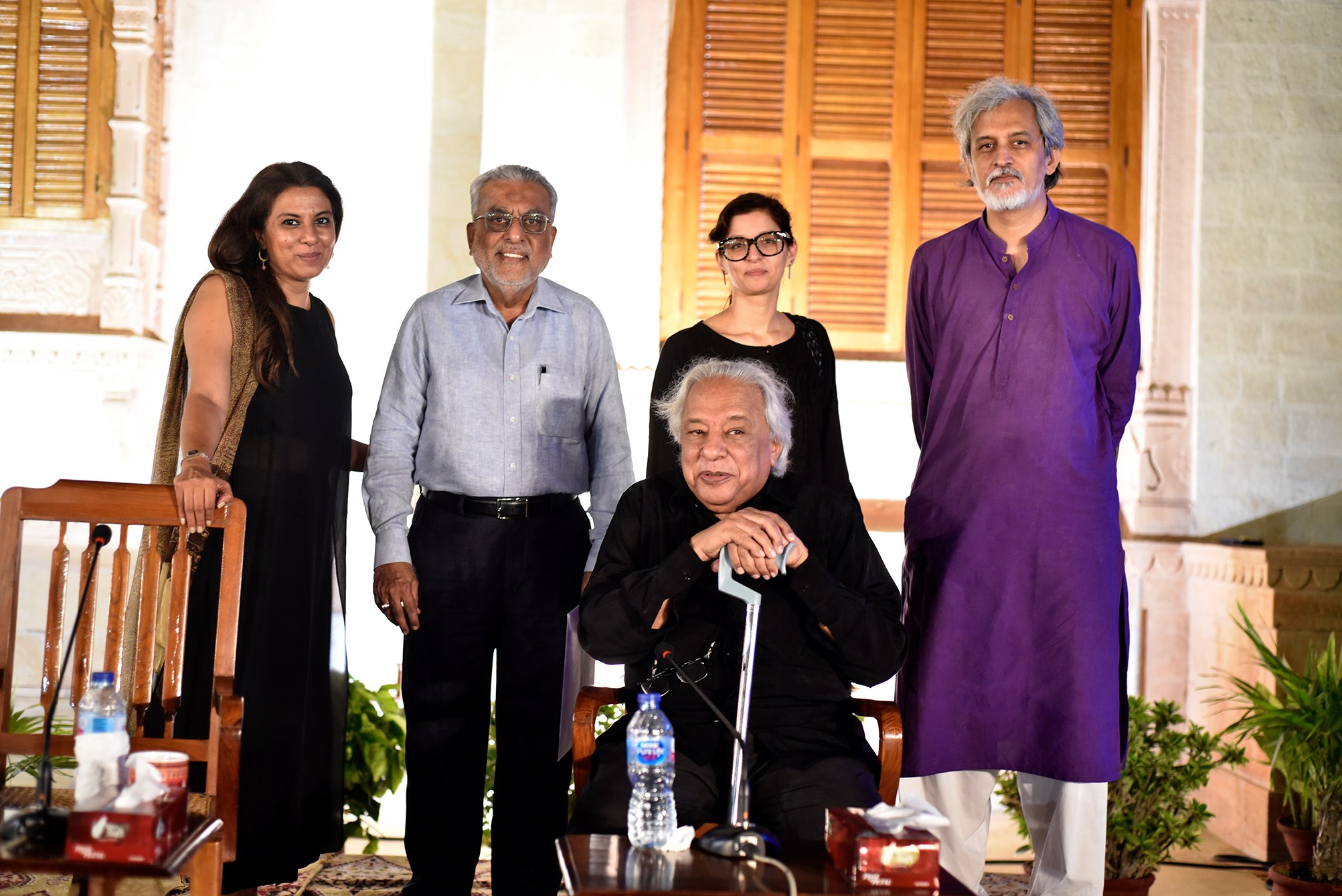Written by: Sania Ahmed Khan
Posted on: September 13, 2019 |  | 中文
| 中文
Panelists at Mohatta Palace (Photo credits to Mohatta Palace Museum on Facebook)
A panel discussion on preserving and restoring heritage was held against the mystical backdrop of Mohatta Palace Museum last Thursday. Titled “Democratizing Heritage Culture in the Urban Context”, the discussion was organized by Mohatta Palace and Endowment Fund Trust for Preservation of Heritage in Sindh, in collaboration with Habib University. The panelists included Taimoor Khan Mumtaz, Arif Hasan, Nur Sobers-Khan and Jameel Yusuf – some of the leading proponents of heritage conservation movements in Pakistan. The discussion was moderated by Saima Zaidi, a communication designer and faculty member at Habib University.
The event attracted a large crowd of heritage studies enthusiasts and Habib University students who were excited to witness two female professors participate in a discussion alongside such luminaries in their fields.
Badshahi Mosque, Hiran Minar, Shahi Qila and Shalimar Gardens are some of the remnants of Mughal rule in Pakistan that are being considered for the World Heritage List. In his presentation, Taimoor Khan Mumtaz explained that the fascination towards Mughal architecture is due to its use of proportional geometry in traditional Islamic patterns, to create harmonious and beautiful buildings. According to Mumtaz, the design methods used by classical Muslim architects were derived from the patterns found in the universe – “the blueprint of creation”. Thus, the creation of meaningful, appropriate and harmonious environments requires a sacred understanding of the world and the human being.

Presentation on the geometry of Mughal buildings (Photo credits to Mohatta Palace Museum on Facebook)
Jameel Yusuf, the Founder Chief of the Citizens Police Liaison Committee (CPLC), acknowledged the architectural marvel of Mughal buildings, and further shed light on Victorian buildings of the colonial era to compare.
His presentation included a screening of Sharmeen Obaid Chinoy’s documentary of the restoration of Imperial Customs House, called ‘Eduljee Dinshaw Road Project’. The restoration work was carried out in 2015 through a public-private partnership. The documentary begins with locals reminiscing about an old, peaceful Karachi which has now fallen prey to a cycle of violence and neglect. Following a project brief by the organizers, there are several aesthetic shots of workers carrying out manual excavation, laying down bricks with cement, and polishing street lamps in shiny, oil-based paint. The result is a clean, well-lit walkway that not only makes the Customs House look presentable, but invites locals for a leisurely stroll in the evening. Final shots depict the peace that is returned to Eduljee Dinshaw Road, as seen by a group of girls swinging on the chain barrier.
As a member of the Guardian Board for the restoration of Frere Hall & Gardens, Yusuf also spoke about the 5-year plan to possibly reverse the effects of degradation and vandalism at Frere Hall. A Memorandum of Understanding (MoU) was signed between Karachi’s Mayor and the Guardian Board, a move which was challenged by the Sindh Government who says the Mayor cannot sign off control of the park to another entity. Despite this resistance, the Board is committed to restoring Frere Hall to its former glory by refurbishing the library, creating designated entry gates, an amphitheater, souvenir shop and a café in its premises. Yusuf hopes that his efforts will inspire others to partake in the restoration of heritage buildings.
Concluding remarks of the evening were presented by Nur Sobers-Khan, former curator of Islamic South Asian collections at the British Library. Based on her experience working in libraries and museums, she analyzed that the management of ‘cultural heritage studies’ is deeply elitist, in that it rarely pays attention to the needs of the residents around the site. Much of the activity and discourse around artefacts is controlled by the elite – whether it is government officials, researchers or even wealthy tourists who can afford to visit museums around the world. The audience seemed to agree that cultural artefacts should allow everyday people to access heritage sites, in order to repossess their knowledge, history and philosophy.
Arif Hasan, whose work encompasses urban planning and development issues, spoke briefly about the repercussions of urban sprawl which has destroyed many of our important heritage buildings. Efforts to bring together urbanization and heritage will need to keep all these factors in mind, and use prior examples of conservation efforts abroad, to ensure the best possible way to protect the heritage sites of our cities.

(L to R) Saima Zaidi, Jameel Yusuf, Arif Hassan, Nur Sobers-Khan, Taimoor Khan Mumtaz (Photo credits to Mohatta Palace Museum on Facebook)
You may also like: